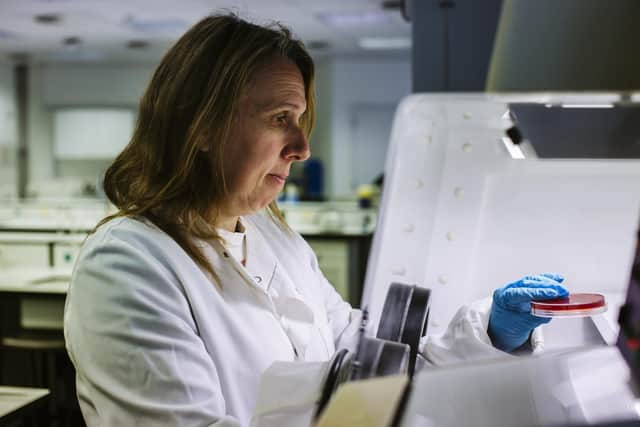Meet the University of Portsmouth microbiologist helping in the fight against coronavirus
and live on Freeview channel 276
Dr Sarah Fouch, senior lecturer in Microbiology at the University of Portsmouth, has maintained her Biomedical Scientists Health and Care Professionals Council (HCPC) registration which enables her to carry out testing for Covid-19 to provide essential diagnostic information for doctors. Sarah, who lives in Winchester, has temporarily joined the research team at Basingstoke Hospital as the government targets 100,000 tests a day by the end of the month.
Dr Fouch said: ‘It’s vital to know how many people who have symptoms don’t have the virus and may be able to return to frontline work.
Advertisement
Hide AdAdvertisement
Hide Ad‘This is absolutely critical for NHS staff. By testing as many people as possible we can also identify those who may have no or mild symptoms and could potentially be infecting other people.’


Despite trials on antibody testing, which identifies whether the person has previously had the virus, testing is still focused on swab tests to see if an individual currently has Covid-19.
Dr Fouch said: ‘There has been a significant increase in the number of tests being carried out. The lab is very busy and last Sunday we tested 200 samples.
‘We soon hope to have an antibodies test but so far trials have proven inaccurate as it needs to detect antibodies specific to Covid-19 and not other types of coronavirus. An inaccurate test could do more harm than good.’
Advertisement
Hide AdAdvertisement
Hide AdIn addition to providing expertise in the form of Dr Fouch, the university has also provided testing equipment to Queen Alexandra Hospital.
‘These machines provide a molecular test to identify the genetic material unique to the virus.’ she added.
While Dr Fouch is not involved with the the process of researching a vaccine she is confident one will be found.
‘Without doubt we will find a vaccine - I’m really confident. Any vaccine will be based on the antigenic structure of the virus.
Advertisement
Hide AdAdvertisement
Hide Ad‘Different viruses contain different antigens which provoke an immune response from the body and so it’s vital to identify antigens specific to Covid-19,’ she said.
Dr Fouch hopes a vaccine will be available by early next year.
‘I’m really pleased to be doing my bit to help fight this virus. There are a lot of people pulling out all the stops and I’m confident any vaccine will be fast-tracked,’ she said.
A message from the Editor
Thank you for reading this story on portsmouth.co.uk. While I have your attention, I also have an important request to make of you.
With the coronavirus lockdown having a major impact on many of our advertisers - and consequently the revenue we receive - we are more reliant than ever on you taking out a digital subscription.
Subscribe to portsmouth.co.uk and enjoy unlimited access to local news and information online and on our app. With a digital subscription, you can read more than 5 articles, see fewer ads, enjoy faster load times, and get access to exclusive newsletters and content. Visit our Subscription page now to sign up.
Our journalism costs money and we rely on advertising, print and digital revenues to help to support them. By supporting us, we are able to support you in providing trusted, fact-checked content for this website.
Comment Guidelines
National World encourages reader discussion on our stories. User feedback, insights and back-and-forth exchanges add a rich layer of context to reporting. Please review our Community Guidelines before commenting.